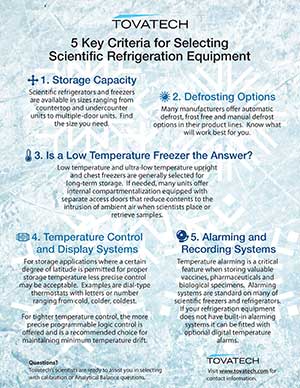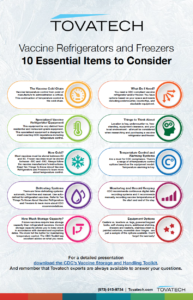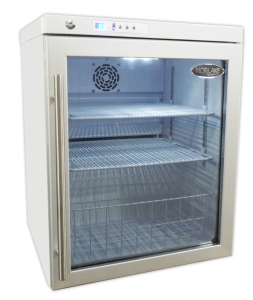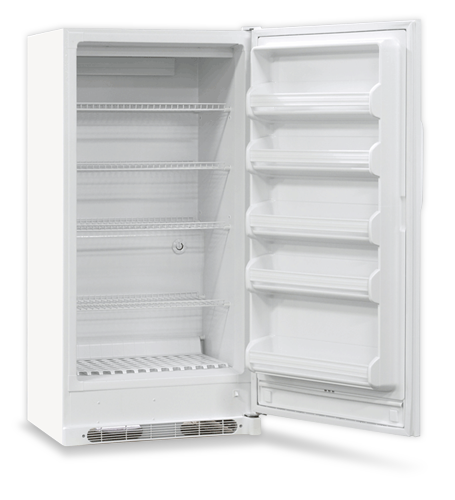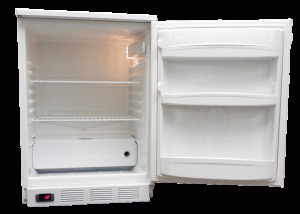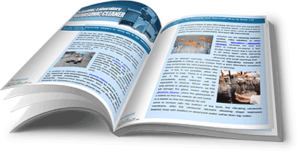Lab Refrigerator
Selecting Scientific Refrigeration Equipment
Scientific refrigeration equipment includes refrigerators and freezers used to store vaccines, pharmaceuticals, biological samples and similar temperature-sensitive products and specimens for healthcare, R&D and related applications. Scientific refrigerators and freezers have critical performance requirements generally unmet by residential and commercial refrigeration systems. For this reason they are highly recommended to protect contents that lose potency or are otherwise compromised by what are called temperature excursions above or below recommended storage settings. Therefore, selecting scientific refrigeration equipment for your needs is key.
Correct storage temperatures are usually recommended by professional or government organizations. The CDC, for example, recommends in its 2016 Vaccine Storage and Handling Toolkit that frozen vaccines be stored between -50⁰ and -15⁰C (-58⁰ and + 5⁰F); refrigerated vaccines should be stored at 2⁰ and 8⁰C (36⁰ and 46⁰ F). Vaccine manufacturers indicate correct storage temperatures that should apply along what is called the “cold chain” extending from the … Read the rest
A Vaccine Refrigeration Specification Guide
Proper vaccine refrigeration is not a hit-or-miss proposition. Each year there are reports on how improper vaccine storage or other mishaps relating to vaccines result in loss of potency. This necessitates locating and revaccinating those who have received compromised inoculations plus the associated cost and inconvenience. Proper vaccine storage is also a critical element for complying with government-funded Vaccines for Children (VFC) programs.
Vaccine manufacturers are careful to note the proper storage temperatures for their products along what is called the cold chain of custody between manufacturing and inoculation. But manufacturers have little influence on the equipment used by healthcare facilities to maintain these temperatures. The CDC (Centers for Disease Control and Prevention) has stepped into this by issuing its 2016 Vaccine Storage and Handling Toolkit to provide comprehensive information on this vital activity. The Toolkit also covers in detail the importance of staff training and written standard … Read the rest
Meeting JCAHO Requirements for Refrigerated Storage
Keypad door locks help meet JCAHO requirements for securing samples stored in healthcare organizations’ refrigerators and freezers. The aim is to control access to lab freezer and lab refrigerator contents while eliminating the risks of keys being lost or duplicated without authorization. A solution for security departments in healthcare organizations and research labs is the Norlake Secure Guard II™ keypad door lock system. It is compatible with Nor-Lake glass and solid door scientific refrigerators and freezers as well as certain models from other suppliers.
Secure Guard II, available from Tovatech, provides up to 250 users with access to refrigerated storage units using their existing magstripe ID or proximity ID cards. Adding and deleting users can be accomplished at the unit. Stored information is safe due to the non-volatile memory. An audit trail of the most recent 1500 access attempts provides date, time and user name, and is downloadable via an … Read the rest
When to Specify a Flammable Refrigerator
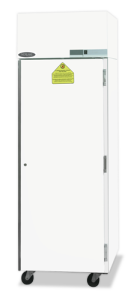
Google refrigerator explosions and chances are you’ll get a lot of hits because of news articles reporting on refrigerator explosions. These events can be spectacular, dangerous and costly. They occur when flammable products are stored in conventional refrigeration units and fumes are ignited by refrigerator electronics such as thermostats, compressors, timers and light switches. A refrigerator for flammable storage is designed to prevent these occurrences. Designs differ from more costly explosion proof refrigerators designed to eliminate the danger of igniting volatile vapors in the laboratory environment.
We agree it is a subtle but important difference. Confusion can occur because most reported refrigerator explosions result when the contents or vapors explode due to an internal ignition source.
Flammable Storage Refrigerator Safety Standards
We’ll start by stating that workarounds do not work when it comes to satisfying NFPA and OSHA guidelines regarding storing … Read the rest
How to Improve Vaccine Storage Temperature Monitoring
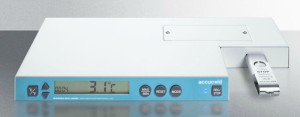
Vaccine storage temperature monitoring and reporting are critical requirements for healthcare facilities participating in the Vaccines for Children (VFC) program. Procedures are clearly spelled out in the CDC’s Vaccine Storage and Handling Toolkit.
To comply with these procedures vaccine refrigerators and freezers must be equipped with temperature alarming and recording devices. A temperature logger kit now available from Tovatech can be installed on vaccine storage units that otherwise meet CDC regulations but lack temperature logging and alarming capability.
NIST-Certified Temperature Logger
Supplied with a 5 volt DC power adapter, the compact .75” x 9.25” x 5.5” (HWD) NIST-calibrated DL2 temperature logger kit stores data on a 4GB USB flash drive for retrieval and archiving to a PC or Mac. It is equipped with a backup rechargeable lithium-ion battery that operates the logger for up to 20 hours in the event of a power failure.… Read the rest
Compact Vaccine Refrigerators Meet Tight State Regs
Tighter state regulations governing vaccine storage may impose stricter standards than those recommended by the CDC for temperature control and uniformity. Small to medium sized practices may want to check their state regulations for vaccine storage, especially if they participate in the Vaccines for Children (VFC) program.
In response to these new regulations Tovatech offers a new compact vaccine refrigerator line designed for small to medium-size medical practices while retaining external dimensions consistent with popular undercounter and countertop models. This is achieved with thicker wall insulation. Units are available in capacities ranging from 0.8 to 3.4 cubic feet (see table).
Vaccine Refrigerator Performance Specs
All models feature digital thermostats and are temperature stable within 2⁰ of set temperatures. All are equipped with high/low temperature alarms and NIST-calibrated internal temperature readouts to the nearest tenth of a degree.
In accordance with CDC recommendations these vaccine refrigerators feature self-closing shelf-less doors to … Read the rest
Glass Front Tabletop Lab Refrigerator with Temperature Alarms
Opening a lab refrigerator to check inventory or retrieve vaccines and biologicals causes an unwelcome interior temperature spike that over time can result in vaccines losing potency. These spikes are more pronounced in a tabletop lab refrigerator typically used in local healthcare clinics and doctors’ offices. A great solution is a glass front tabletop lab refrigerator with audible and visual high-low temperature alarms. Healthcare providers check contents at a glance with the door shut. A switch-activated interior light makes inventory taking easier.
Now available from Tovatech the 2.4 cubic foot capacity Norlake LR031WWG/0 compact table top glass door lab refrigerator features a digital LED display microprocessor temperature control. This allows healthcare personnel to set internal temperatures from +2⁰ to 10⁰C, and it continuously displays content temperature.
The unit is equipped with an internal fan to stabilize cooling and the cabinet is foamed-in-place with … Read the rest
Vaccine Refrigerators for the 2014 Flu Season
The fast-approaching 2014 flu season serves as a reminder for healthcare facility operators to review their vaccine storage practices especially relating to the ability of their vaccine refrigerators to maintain the correct storage temperature. As reported in previous Tovatech posts costs related to loss of vaccine potency due to human error and mechanical failure can be very substantial. Most of these losses occur at the end of the vaccine cold chain – when they arrive at clinics and stored prior to being administered to patients.
Minimizing Vaccine Storage Losses
Human error can be lessened and hopefully eliminated by establishing comprehensive vaccine storage and handling guidelines as suggested in the CDC’s Vaccine Storage and Handling Toolkit. Losses related to improper storage temperatures can be minimized or eliminated when refrigeration equipment is designed to maintain tight temperature tolerances. The proper storage temperature for refrigerated vaccines is provided by the manufacturer but normally … Read the rest
Storage Tips to Help Safeguard Vaccines
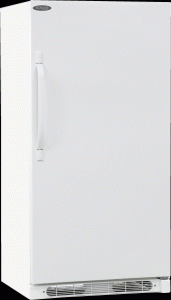
Vaccine storage is an important topic that must be addressed by hospitals, clinics and other healthcare facilities. A good reference is the CDC’s Vaccine and Storage Handling Toolkit*. Among the suggestions are segregating different vaccine formulas used in these facilities to areas that are clearly identified. Store by expiration dates and administer vaccines following first-in-first-out procedures. Expired vaccines should be disposed of in an approved manner in accordance with state health requirements. (Updated December 26, 2013)
Vaccines lose their potency if improperly stored. Clinics should follow manufacturers’ recommended storage temperatures. Residential-grade refrigerators and freezers are not designed to maintain the temperature consistency necessary for proper storage of vaccines. Using these types of units can result in financial loss for clinics and patient aggravation due to spoiled vaccines.
If budgets do not permit the purchase of pharmacy-grade refrigerators and freezers, laboratory refrigerators and and laboratory freezers such
How to Store Hepatitis Vaccine
Proper refrigerated storage of hepatitis vaccines is essential to maintain potency as well as to avoid substantial monetary losses due to lack of potency and the time and inconvenience to revaccinate patients. Proper vaccine storage is also required for providers participating in the Adult Hepatitis Vaccine Project, which is equivalent to the Vaccines for Children program. AHVP compliance is necessary for providers participating in the project and receiving state-supplied vaccines.
Step 1: Calculate Vaccine Storage Requirements
Healthcare providers should calculate the number of hepatitis vaccines they will store in their refrigerator. This is done by adding the number of public and private vaccines on hand from the last order and multiplying that number by 1.25 to determine total doses. Using the table below match this number with the minimum cubic feet required for storage.
|
Maximum doses | Minimum cubic feet |
|
1000-2000 |
40 |
